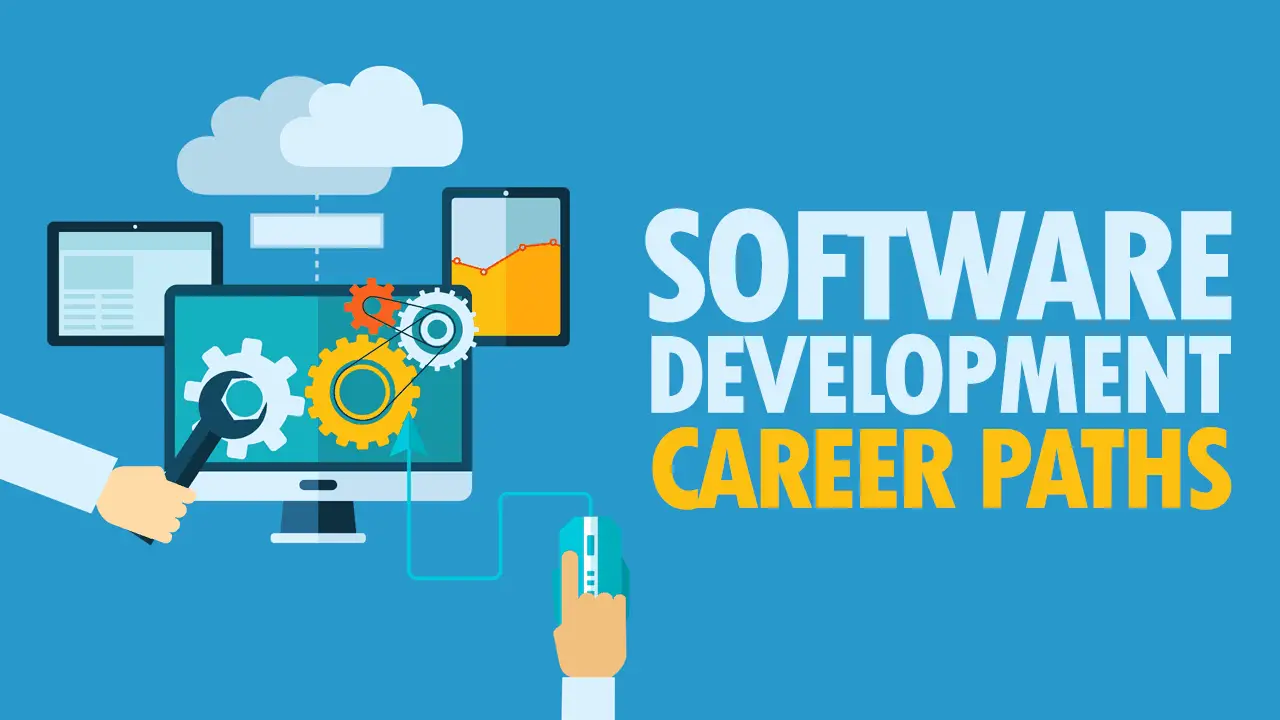Considering a career that combines creativity, problem-solving, and technology? If so, becoming a software developer in the United States can offer an exciting path. This blog will delve into the details of this career choice, exploring its advantages, challenges, growth prospects, required skills, and more. By the end of it all, you’ll gain a clear understanding of whether the journey as a software developer is the right fit for you.
Unveiling the Role of a Software Developer
Software developers, often likened to digital architects, hold the crucial responsibility of crafting, designing, and constructing computer programs and applications that form the backbone of our daily reliance on technology. They possess a certain mastermind quality akin to the creators behind your beloved apps and games who ingeniously make them both functional and user-friendly.
 The Benefits of Choosing Software Development
The Benefits of Choosing Software DevelopmentLet’s explore the remarkable benefits awaiting aspiring software developers:
1. Lucrative Remuneration
Software development offers a financially rewarding career path. In the United States, software developers consistently earn salaries that surpass the national average. This makes it not only a profession driven by passion but also a pathway to achieve financial stability and personal growth.
2. Nurturing Creativity
Software development, at its core, embodies the essence of an art form. It becomes a canvas for individuals to unleash their creative prowess and cultivate innovative ideas while crafting both functional and visually captivating applications. 3. Problem-Solving GratificationSoftware developers are like modern-day troubleshooters. They fearlessly confront intricate problems, leveraging their analytical prowess and innovative thinking to craft effective solutions. This perpetual exercise in finding resolutions keeps their minds actively engaged and contented.
4. Thriving Demand
The digital revolution has triggered an increased demand for skilled software developers across various industries. From tech giants to startups, companies heavily rely on software solutions for efficient operations and customer engagement. Consequently, the need for competent developers remains consistently high, ensuring job security and a plethora of employment opportunities.
5. Flexibility and Autonomy
Software developers often enjoy the freedom to work remotely or set flexible schedules. This independence cultivates a better work-life balance and empowers professionals to shape their work environment according to their preferences. As a result, job satisfaction is increased.
6. Global Collaboration
The nature of software development promotes global collaboration amongst professionals, transcending geographical boundaries. This fosters a diverse and enriching professional network, allowing developers to contribute to projects and initiatives worldwide.
7. Tangible Impact
Software professionals, through their expertise, impact numerous facets of modern life. They are instrumental in domains like healthcare, education, entertainment, and communication. Software developers shape the technological landscape and contribute significantly to enhancing human experiences.

Navigating the Challenges
While the journey is promising, there are challenges to consider:
1. Continuous Learning
Technology progresses swiftly, with new programming languages, frameworks, and tools constantly emerging. It is crucial to stay updated in order to keep pace but staying abreast can sometimes feel overwhelming. Embracing learning involves approaching it as a continuous journey. It is important to allocate dedicated time for activities like reading, enrolling in online courses, and attending workshops. These efforts will ensure that your skills remain up-to
2. Balancing Deadlines
Managing projects often requires meeting tight deadlines. It becomes crucial to strike a balance between maintaining quality and working efficiently. Here is a narrative on how one can effectively handle this challenge:
3. Complex Problem Solving
Software development involves tackling complex problems. Sometimes, developers may encounter daunting obstacles that appear insurmountable. However, they can overcome these challenges by utilizing effective strategies and seeking support from their peers
4. Adapting to Change
Technological trends shift rapidly. What’s popular today might become outdated tomorrow. Adapting to change can seem daunting. However, there is a way to navigate this challenge. ###
5. Communication Barriers
Software development projects often require collaboration among teams. To prevent errors and delays, effective communication is essential. Here are some tips for communicating efficiently:
6. Work-Life Balance
The passion for coding can sometimes result in extended working hours, which highlights the importance of maintaining a healthy work-life balance. It is crucial to find equilibrium between one’s dedication to coding
7. Imposter Syndrome
Imposter syndrome, a feeling of inadequacy despite one’s accomplishments, has the potential to impact even the most experienced developers. This narrative aims to reveal strategies Acknowledging achievements is essential. Take time to celebrate your successes, no matter how small they may seem. It’s valuable to maintain a record of your accomplishments, serving as a reminder of the skills you possess.

Skills That Set the Course
To flourish as a software developer, certain skills are vital:
1. Coding Languages
Learning programming languages like Java, Python, or JavaScript is crucial as they serve as the means to communicate with computers. These languages act as the tools that enable effective interaction and understanding between individuals and computing systems
2. Problem-Solving Acumen
Developing a talent for creative problem-solving allows individuals to effectively troubleshoot and enhance software, resulting in improved efficiency.
3. Detail-Oriented Mindset
In coding, precision holds utmost importance. Paying attention to detail helps prevent minor errors from turning into major problems.
4. Team Player Mentality
Collaborating with fellow developers, designers, and testers plays a pivotal role in ensuring the success of software development projects. The synergy between these
Navigating Future Horizons
The journey of a software developer extends beyond the present, offering a range of exciting pathways to explore:
1. Specializations Await
Software development is comparable to a treasure chest overflowing with endless possibilities. Within this realm, individuals can explore and specialize in various areas that spark their interest and align with their strengths. Whether it be the domain of web development, app creation, artificial intelligence or cybersecurity – the options are boundless. These distinct fields open up exhilarating opportunities for enthusiasts to delve into their passions and discover what truly captivates them.
2. Climbing the Ladder
Starting as a software developer is just the beginning. As one gains experience and expertise, there is an opportunity to progress up the career ladder. Roles like senior developer may come into play, where valuable insights and skills can guide junior developers. Eventually, reaching the position of a lead developer becomes possible, overseeing projects and teams. However, this journey does not end here; the world of tech leadership opens up as the next potential destination.
3. Seeding Entrepreneurial Ventures
Are you experiencing the desire to embark on an entrepreneurial journey? The field of software development opens up opportunities for creating something entirely innovative. By designing your own software applications or groundbreaking digital solutions, you can enter the realm of entrepreneurship. Building your own tech startup could be a promising path worth considering. It allows you to combine your technical expertise with your imaginative vision, resulting in not only problem-solving solutions but also influential contributions that shape the future.

Embarking on the Software Development Journey
To embark on the journey of becoming a software developer, let us provide you with a carefully crafted roadmap to steer you in the right direction.
1. Educational Foundation
To begin, establish a solid educational foundation. One approach is pursuing a degree in computer science or related fields. Alternatively, if you prefer a different pathway, there are various online platforms that offer a wide range of courses to help you get started.
2. Dive into Practice
The art of coding flourishes through practice. Similar to fine-tuning a musical instrument, consistent practice is crucial to mastering coding. Embrace coding challenges, embark on small projects, and gradually enhance your skills.
3. Crafting Projects
To enhance your learning, apply it practically to real-world projects. Begin with simpler tasks like creating a personal website or developing a basic app. These hands-on experiences will not only reinforce your understanding but also bolster your confidence in the subject matter.
4. Internship Exploration
Internships serve as a valuable link between academic learning and real-world application, providing invaluable insights into the professional software development sphere. By working alongside experienced developers, interns gain firsthand knowledge and experience in teamwork dynamics and project management.
5. Sustain Curiosity
In the realm of technology, fostering curiosity becomes an invaluable ally. By keeping a keen eye on emerging trends and tools, one ensures continuous learning and exploration, enabling adaptability and embracing new challenges with readiness.
In Summation
Is pursuing a career as a software developer a wise choice in the USA? Absolutely! This profession offers intriguing challenges, creative triumphs, and satisfying opportunities. The demand for skilled developers is robust, and the financial rewards are enticing. Moreover, the sense of accomplishment derived from translating code into functional reality is unparalleled. Of course, like any career path, there will be highs and lows to navigate. However, if you possess an appetite for learning, adaptability, and have a knack for crafting exceptional digital solutions, becoming a software developer could be the perfect avenue to fulfill your aspirations.




